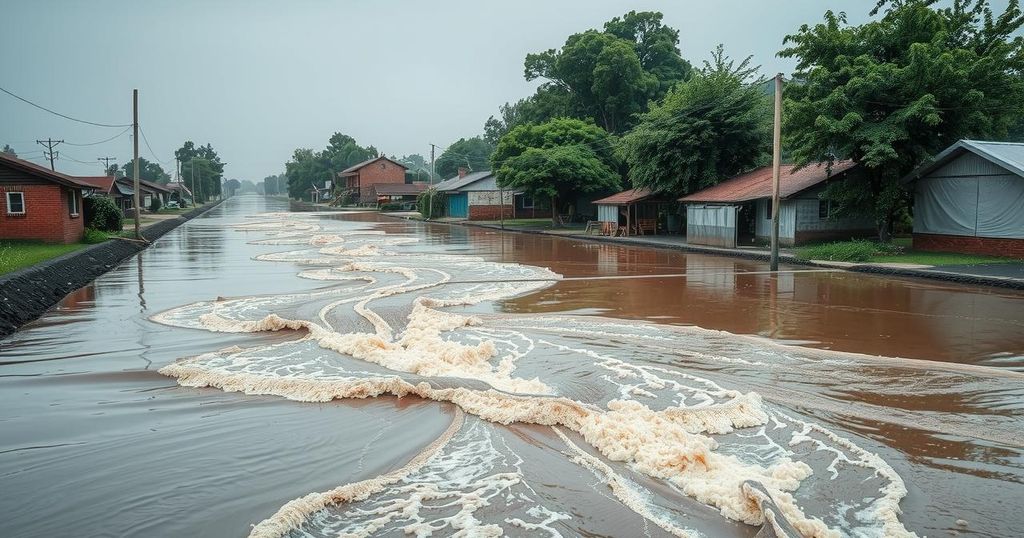Devastating Flooding of the Nile Forces Thousands to Seek Refuge in South Sudan
The overflow of the River Nile has displaced thousands in South Sudan, submerging villages and farmland, and leading to livestock fatalities. Communities are increasingly reliant on humanitarian aid due to insufficient local resources amidst ongoing climatic and socio-economic challenges. The Jonglei Canal, originally intended for irrigation, now serves as a refuge for those affected, underscoring the severity of the situation.
The ongoing overflow of the River Nile has compelled thousands of individuals in South Sudan to seek refuge along the edges of canals as relentless flooding submerges entire villages, devastates farmlands, and causes significant livestock fatalities. In Jonglei state, long-standing residents such as Bichiok Hoth Chuiny recount the severe impact of these floods, which have displaced her and countless others from their homes. The flooding, attributed to extensive rainfall and the opening of dams upstream, has displaced over 379,000 people this year, according to the United Nations humanitarian agency. With communities like Pajiek transforming into makeshift settlements, local inhabitants are struggling to adapt to a new reality where food and healthcare resources are scant, relying heavily on aid from organizations like the World Food Program (WFP). Additionally, the local economy has suffered immensely since the country’s independence, with ongoing civil unrest and environmental disasters exacerbating the vulnerabilities of its people, particularly in regard to agricultural practices and livestock rearing.
Communities surrounding the Sudd wetlands have a historical connection to seasonal flooding; however, the incessant rise of water levels has resulted in a deterioration of livelihoods. Detrimental climate effects and infrastructural neglect render South Sudan particularly ill-equipped to address such challenges. Long-standing issues of governance and economic instability play a vital role in the current crisis, as individuals like Nyabuot Reat Kuor reveal the drastic changes in their lives due to the flooding and the ongoing risk to their health and well-being. The lives of those torn from their ancestral land illustrate the dire consequences of climate change coupled with socio-political strife, giving global observers a stark view of the devastating impacts faced by the populace.
The Jonglei Canal, constructed out of colonial ambition, has ironically become a lifeline for many, providing a semblance of refuge amid the chaos. However, the lack of essential services, combined with an overwhelming need for aid, paints a bleak picture of survival for these displaced communities, as they navigate the uncertainty of their existence in a landscape that has been irrevocably altered.
Climate change poses a significant threat to South Sudan, a country already grappling with the aftereffects of civil war and inadequate infrastructure. The River Nile’s overflow represents a culmination of environmental challenges exacerbated by human factors, including the management of upstream dams. Across South Sudan, particularly in Jonglei state, the prolonged flooding has transformed traditional pastoral lifestyles, forcing communities to adapt rapidly to precarious living conditions. As the economy falters alongside widespread displacement, humanitarian efforts become increasingly critical to delivering aid to those affected.
The flooding of the River Nile has become a devastating annual phenomenon for South Sudan’s pastoral communities, leading to widespread displacement and loss of livelihoods. Vulnerabilities are heightened by a combination of climatic changes and socio-political instability, leaving countless families to rely on external aid while coping with the harsh realities of their new circumstances. This situation highlights an urgent need for sustained international attention and effective support systems to address both immediate humanitarian needs and long-term recovery strategies in the face of perpetual environmental threats.
Original Source: www.the-independent.com




Post Comment